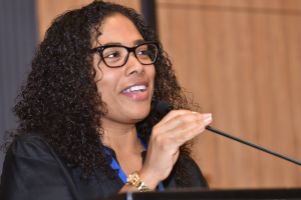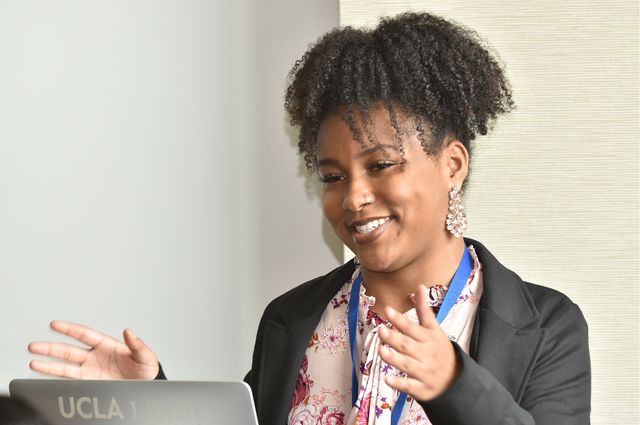As UCLA undergraduate Jendalyn Coulter spoke to the several dozen professors, students and educational leaders about her research on former foster youth who go on to college, she was poised and commanded the room.
The fourth-year sociology major and education minor, who is herself a former foster youth, was presenting her research, answering the audience’s questions about her research methods as part of the National McNair Scholars Conference, which this year was held at UCLA for the first time.
Hosted by the UCLA Academic Advancement Program and the UCLA Graduate Division, the conference drew more than 250 students from universities across the country to the Luskin Conference Center. The students are all members of their universities’ McNair Research Scholars program — a two-year program in which students who are either first-generation college students with financial need or members of groups that are underrepresented in graduate education, learn about research methods, complete original research projects and apply to graduate school.
Coulter credits the McNair program with providing her the tools she needs to reach her ultimate goal of earning her doctorate.
“The McNair Research Scholars program is amazing because it helps provide me with the resources, the information, knowledge, mentorship and guidance to know what it’s like to conduct my very own research project and also the support to help us navigate the grad school application process,” Coulter said. “It’s been tremendous and honestly, without it I don’t know how I would even get here.”
During the conference, which took place July 25–27, the students in attendance had their pick of activities designed to prepare them for not just getting into graduate school but succeeding once there. They had opportunities to give oral and poster presentations about their research, attended graduate school preparation workshops, and met graduate program representatives.
UCLA Chancellor Gene Block welcomed everyone and speakers included Lorrie Frasure-Yokley, associate professor of political science at UCLA and the first in her family to to go college; Miguel Garcia-Garibay, dean of the division of physical sciences in the UCLA College; and Robin Garrell, vice provost for graduate education and dean of the graduate division.

The speakers encouraged the students to not give in to “imposter syndrome,” to speak up for themselves and their research, and to cultivate relationships with faculty and colleagues who will support their goals.
“Believe in being a voice for the voiceless,” Frasure-Yokley told the students in her keynote speech. “Academia needs you, and the world, especially today, needs your research.”
Garcia-Garibay got the students laughing during his candid speech about his life and career, which included a three-year stint as a truck driver (“I loved it!” he said), a brief period of working in the United States without a visa, and finally “getting paid to do what I love” at UCLA.
“I’m so glad you’re part of the McNair program because you have the opportunity to see whether [your research] is your passion,” he said. “For some of you, it will be something you want to explore for the rest of your life.”
For the five weeks leading up to the conference, UCLA McNair Research Scholars participated in a summer research institute on campus, hosted by the Academic Advancement Program. During those five weeks they developed their research and writing skills as they worked on their independent research projects, received GRE tutoring, attended workshops on academic career opportunities and prepared for the graduate school application process.
Because the conference was held at UCLA, second-year transfer history major Matthew Ospina was able to invite his family, friends and professor to attend his presentation about collective memory in the Colombian-American community of Jackson Heights in New York City. Having that support around him made the “nerve-wracking” experience of giving an oral presentation easier.
“It’s been a new kind of challenge where I’m not just with my materials and books and archives that I’m used to as a historian, but it’s something that’s necessary and I think it’s good to tackle it now,” Ospina said.
Alice Ho, director of AAP’s research programs, was proud to host the conference and show McNair scholars from across the country what UCLA has to offer. By giving students the opportunity to meet others in related fields, exchange ideas and provide feedback, they experienced what it’s like to participate in a national research conference.
“Through hosting the conference, UCLA got the opportunity to bring together the next generation of faculty members and scholars from across the country,” Ho said. “The McNair Scholars are prepared to bring their diverse experiences and perspectives to graduate school and the academic profession.”





